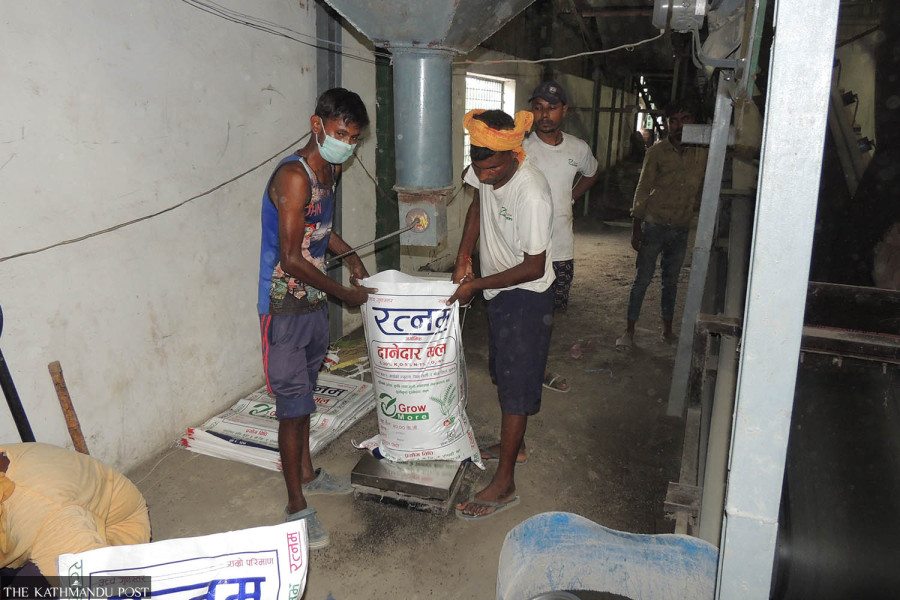Money
Rs300 million granulated organic fertiliser plant opens in western Nepal
The plant’s production capacity is 200 tonnes daily. The company has opened sales depots in more than 100 locations of several provinces.
Dipendra Baduwal
During Covid, many farmers in western Nepal suffered a severe fertiliser shortage, and crossing to India over porous border points to bring them was fully restricted. A couple in Rupandehi made up their minds—to open an organic fertiliser plant.
Months after the plan, Siddhartha Agrawal and Poonam Kumari opened a Grow More Fertiliser and Chemical plant in Kothawa of Rohini rural municipality-4.
“We started producing and distributing Ratnam granulated organic fertiliser. It’s the first granulated organic fertiliser produced in Nepal,” said Siddhartha.
“It’s the best fertiliser for the soil as it contains a balanced quantity of nitrogen, phosphorus, potassium, sulphur, magnesium, iron, boron, and calcium, etc.”
The company has invested Rs300 million in the plant spread over five bighas. The company aims to supply fertiliser to farmers' doorsteps.
Farmers feel relieved as the production starts arriving in the market.
“There is a mix of all materials essential to maintain soil health, as tests have proven. We believe using fertiliser helps grow agricultural output,” said Siddhartha.
The investment comes as factories in the district are shutting down due to an economic slowdown.
The factory initially targeted to supply fertiliser in Lumbini, Gandaki, Bagmati, and Madhesh provinces.
“The factory’s production capacity is 200 tonnes daily. We will ramp up the capacity based on the market demand,” said Siddhartha, adding that the factory has been distributing the fertiliser by opening sales depots in more than 100 locations in the provinces.
The factory has obtained production permits from the Lumbini provincial Ministry of Agriculture and Livestock Development.
Managing Director Poonam Kumari said they were motivated to open a fertiliser factory after observing a severe scarcity during the Covid pandemic.
“After that, we started construction.”
She said it took them a year to get government approval. “It took another year to test the fertiliser—it’s impact on plant growth,” she said. After the successful test, the production and supply began.
The fertiliser targets vegetable cultivation—both rooftop and terrace farming. It can also be applied to paddy, wheat and maize, besides legumes like lentils.
It is also suitable for cash crops like sugarcane and tea, said Poonam Kumari.
The fertiliser is available in 5 kg, 25 kg and 50 kg packages.
Multiple factors are behind the shortage of chemical fertilisers in Nepal—from lean inventories and poor supply mechanisms to faulty policies and international pricing factors. These cause chronic distress to the tens of thousands of farmers annually who face other risks like droughts, floods, and crop failure.
Agriculture is the mainstay of Nepal's economy, employing around 60 percent of the total workforce and contributing 24 percent to the national economy.
The Ministry of Agriculture and Livestock Development has estimated that the annual demand for fertilisers stands at around 700,000 tonnes.
However, the estimate is years old, and there has been no study to find the actual demand.
A separate report by USAID, an international development agency, has shown that Nepal is highly dependent on smuggled fertilisers and estimates that nearly 70 percent of the 600,000 to 800,000 tonnes of the plant nutrients are improperly imported.
An agricultural country, Nepal depends on fertiliser produced in other countries. “Not only that, farmers have to wait in long queues all day to get a bag of fertiliser,” said Siddhartha. “Nepal has been spending billions on fertiliser imports.”
He hopes their output will be able to meet a sizeable market demand in the future.
He said that compared to chemical fertiliser, Ratnam is cheaper and of more quality. “Our target is to replace chemical fertilisers gradually. Our production is getting huge demand from local farmers and even those in India.”
A 50 kg diammonium phosphate (DAP) bag costs around Rs2,400 while Ratnam is priced at Rs1,200. “This is why we are requesting all to use Ratnam,” said Poonam Kumari.
The factory currently employs 40 people.




 14.12°C Kathmandu
14.12°C Kathmandu













